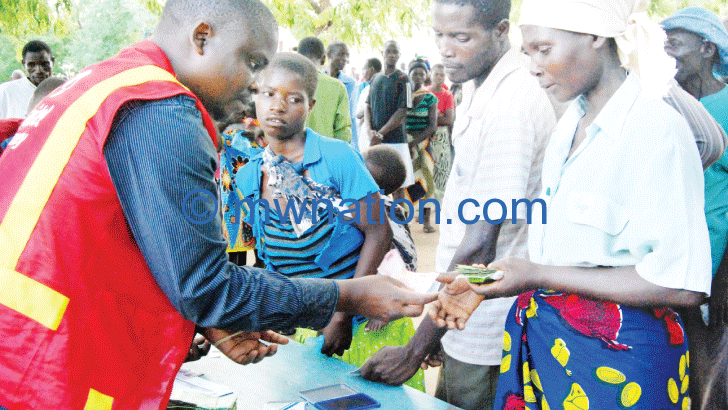Cash transfers yet to impact poverty
Despite the overwhelming positive evidence on the effectiveness of cash transfers in Malawi, their current benefit levels are too low to impact on poverty, United Nations Children’s Fund (Unicef) has said.
In its published 2019/20 Malawi Social Welfare Budget Brief, the organisation observes that Social Cash Transfer Programme (SCTP) coverage is limited to the 10 percent poorest of the population, while the Government of Malawi recognises that 51.5 of the population lives in poverty.

The organisation observes that the average monthly transfer value (K7 000) is around 20 percent and 12 percent of the extreme and moderate poverty lines, respectively while on the other hand, benefit levels, last revised in 2016, are continuously being eroded by inflation (now at 9.8 percent) with negative impacts on child welfare.
In addition, there are clear linkages between the agricultural cycle, dependant on the rains, and seasonal price patterns in Malawi, with food-inflation spiking during the lean season, further eroding the value of the cash transfer.
Reads the brief in part: “There are synergetic investment opportunities for the current social protection system in Malawi. For instance, there is potential for the government to use existing social protection systems to complement other programmes, including humanitarian support and disaster financing to mitigate the impact of climatic shocks.
“Such synergies would move the country towards the adoption of a shock responsive social protection system, advocated for by leveraging on the ongoing intervention on nutrition could bring the country closer to applying a nutrition-sensitive social protection system.”most donors. In a similar fashion,
Malawi has significantly increased its allocation to the SCTP for the 2019/20 Financial Year with an allocation of K2.5 billion to the programme, a 67 percent increase from the K1.5 billion allocated the previous year.
However, notwithstanding the increase, social protection continues to be largely donor funded. In the current financial year, for example, 93 percent (K34 billion) of the on-budget social protection programmes are funded by donors, according to Unicef.
Currently, government’s contribution to the SCTP stands at 7 percent with the rest coming from donors. The main funders of the programme are the KfW (seven districts), the European Union (seven districts), the World Bank (11 districts), the Irish Aid (two district), with the Malawi Government covering the remaining district and the UN offering technical support.
Minister of Gender, Children, Disability and Social Welfare Mary Navicha earlier told a SCTP Annual Review, Planning and Budgeting Meeting in Mangochi in July that the programme has transformed lives from poverty to an improved livelihood.
She said the targeted households are able to run some small businesses and buy some assets such as livestock.
“The coming of the programme has largely reduced the various challenges vulnerable persons were facing in the country because we have seen the targeted families being able to buy food or produce on their own enough as well send their wards [children] to school,” said Navicha in an interview.
The Malawi SCTP, also known as Mtukula Pakhomo, is an unconditional transfer targeted to ultra-poor and labour-constrained households. The main objectives of the SCTP are to reduce poverty and hunger, and to increase school enrolment.





